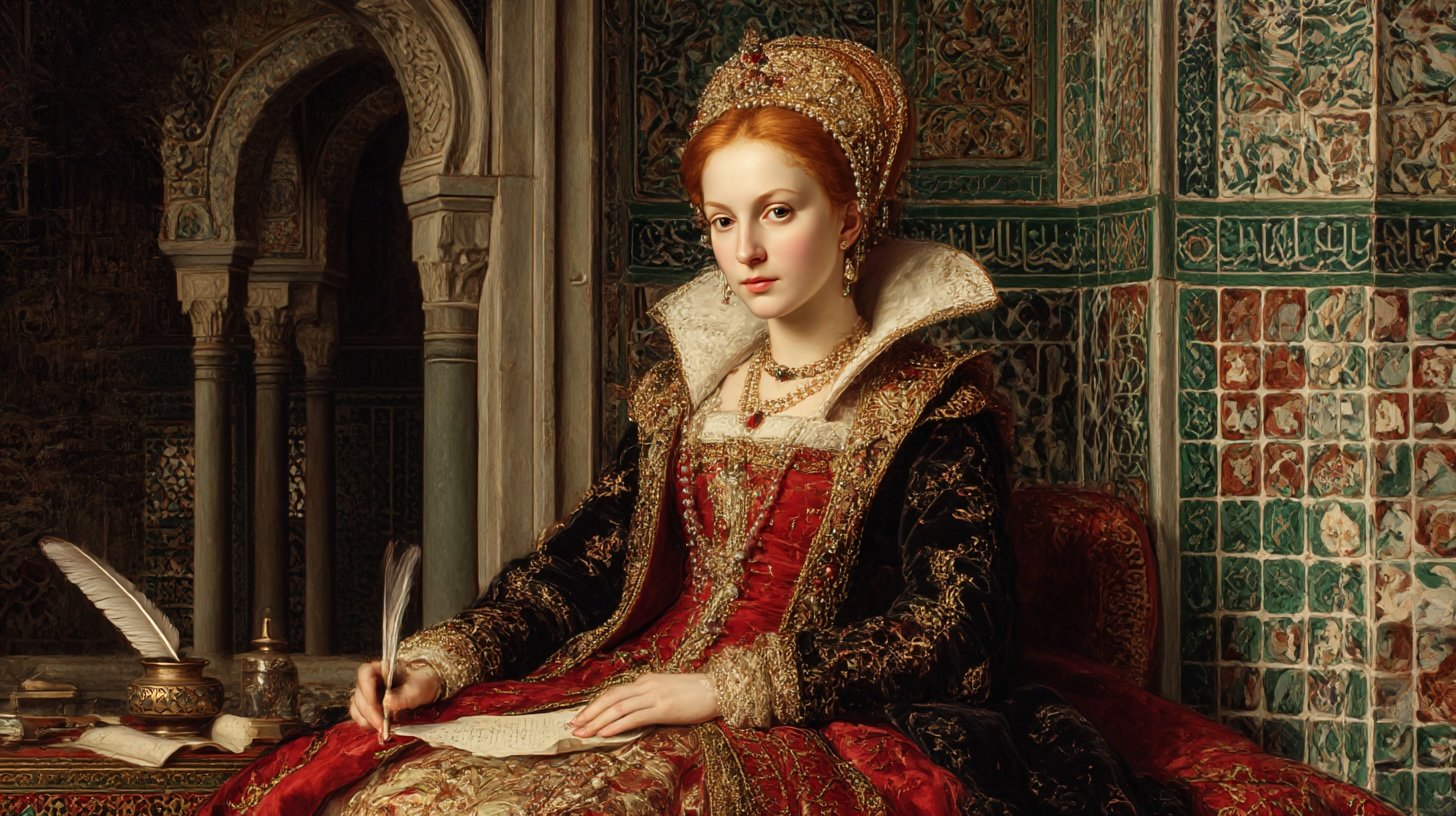Hürrem ’s Pen: How the Sultan’s Wife Outsmarted Europe
Hürrem Sultan had more titles than a mediocre Netflix series, and quite possibly more plot twists. The wife of Suleiman the Magnificent, mother of princes, mistress of the Ottoman court, confidante to scholars, pen pal to European royals, and architect of a geopolitical soap opera that would make even Machiavelli pause and blink. Her story isn’t one of soft veils and submissive silences. It’s laced with cunning correspondence, embroidered diplomacy, and a touch of theatrical flair that would put any Renaissance court to shame.
She started as Roxelana, a girl of Ruthenian origin, kidnapped during a Tatar raid and sold into the Ottoman imperial harem. That alone would be enough material for a historical tragedy. But Hürrem didn’t do tragedy; she preferred strategy. Rather than blend in among the silks and incense, she stood out. Rather than dream of escape, she plotted ascension. And when she reached the top, she didn’t just enjoy the view – she rewrote the entire script.
For starters, she broke the golden rule of the Ottoman harem: don’t marry the Sultan. Concubines were meant to produce heirs and politely vanish. But Hürrem wasn’t built for vanishing. She convinced Suleiman not only to keep her around, but to marry her. Legally. In a ceremony. With witnesses. This was the empire’s equivalent of a royal scandal. The court scribes practically dislocated their wrists in disbelief.
But that wasn’t even her boldest move. Hürrem had a pen and she wasn’t afraid to wield it. While her husband was off conquering fortresses or fine-tuning imperial law codes, she composed letters. Not the decorative kind either – these were strategic missiles wrapped in calligraphy. Some were tender notes to Suleiman, laced with affection and elegant flattery. Others were diplomatic dispatches to European leaders, cloaked in velvet language but sharpened with intent.
She corresponded with Sigismund II Augustus of Poland like she was nurturing a secret chess match. As if becoming pen friends with monarchs was the latest hobby trend for ambitious housewives. Her letters weren’t simply warm greetings; they were finely tuned instruments of influence. She spoke of peace and shared interests, while subtly guiding European attention away from her adversaries and nudging alliances toward her son’s advantage.
If European ambassadors assumed they were outplaying some naive harem woman, they were in for a stinging lesson. Hürrem could outmanoeuvre them before they even had breakfast. She grasped the theatre of power, not just its structure. Her public image was curated with the finesse of a Renaissance artist. Her charitable foundations, mosques, soup kitchens, and schools weren’t just pious gestures – they were branding campaigns. Her name appeared on fountains and madrassas from Jerusalem to Istanbul. This was Ottoman PR, centuries before marketing departments were a thing.
And she wasn’t shy about playing politics at home, either. The harem was no serene sanctuary – it was a nest of vipers with nicer wallpaper. Hürrem outfoxed rivals with lethal grace, neutralised Suleiman’s other sons and their politically ambitious mothers, and positioned her own son, Selim, for the throne. She played the long game, managing bloodlines, loyalties, and legacies, all while maintaining the aura of serene domesticity and divine favour.
She wasn’t just scheming in secret either. Hürrem knew when to be seen. She accompanied Suleiman on campaigns, a move unheard of for women in her position. She appeared in public, not just veiled shadows behind lattice screens. Her presence sent a message: she wasn’t merely a mother of princes. She was a partner in empire.
Europe had queens, sure. But none quite like Hürrem. She had no crown, no official title beyond the poetic ones granted in court poems. She was never knighted, never formally briefed by the imperial council. And yet, through her ink-stained fingers and sharp intelligence, she shaped borders, stirred loyalties, and caused ripples in the courts of Vienna, Krakow, and beyond. Diplomats speculated. Monarchs worried. Ambassadors wrote reports fretting about her influence. The harem, they realised, was not just a private world. It was a nerve centre.
She didn’t need a sword to change history. She had ink. And a hand steady enough to sign the 16th-century world into new alignments. Her influence lingered in the corridors of power long after her final letter was sealed.
When she died in 1558, Suleiman mourned her not just as a wife but as a political companion. He wrote verses soaked in grief. The empire mourned her in domes and minarets. Her mausoleum near Suleiman’s own in the Süleymaniye Mosque still catches sunlight as if the heavens remember her daily. Historians, centuries later, continue to argue about just how she did it – how a foreign-born concubine outwitted seasoned statesmen, outlasted palace intrigues, and outshone nearly every woman of her age.
But one thing is clear: Hürrem’s pen didn’t just write history. It rewrote the rules. It sketched power dynamics. It redrafted maps. And it did so from the plush yet perilous backrooms of the harem, where the stakes were high and the silence deadly.
Not bad for a girl once sold at a slave market. Not bad at all.
